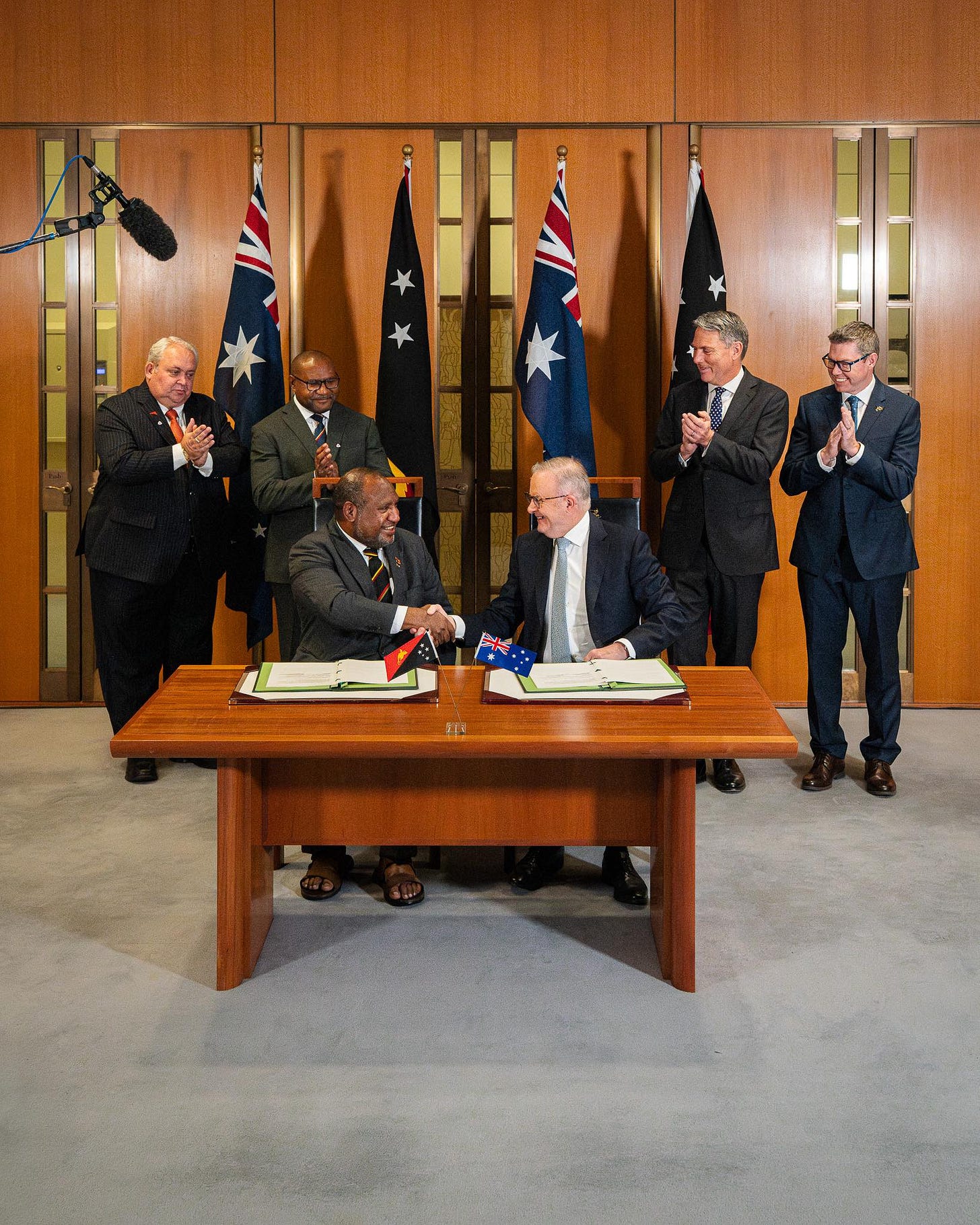Australia, Papua New Guinea Sign Historic Defense Alliance, Opening Military Recruitment Pathway
‘Pukpuk Treaty’ marks Australia’s first new alliance in 70 years, PNG’s first ever, with mutual defense obligations mirroring ANZUS pact
This piece is freely available to read. Become a paid subscriber today and help keep Mencari News financially afloat so that we can continue to pay our writers for their insight and expertise.
Today’s Article is brought to you by Empower your podcasting vision with a suite of creative solutions at your fingertips.
Australia and Papua New Guinea signed a landmark mutual defense treaty today that elevates their relationship to a formal military alliance for the first time, with Prime Minister Anthony Albanese calling it “Australia’s first new alliance in more than 70 years.”
The Papua New Guinea-Australia Mutual Defence Treaty, dubbed the “Pukpuk Treaty,” creates binding mutual defense obligations between the two Pacific neighbors and establishes a pathway for up to 10,000 Papua New Guinean citizens to serve in the Australian Defence Force over time.
“This treaty elevates the relationship between our two nations to the status of an alliance,” Albanese said at a signing ceremony in Canberra with PNG Prime Minister James Marape. “It is Australia’s first new alliance in more than 70 years and only the third in our history along with our alliances with the United States of America and New Zealand.”
For Papua New Guinea, the pact represents the nation’s first formal military alliance with any country since gaining independence from Australia in 1975.
Truth matters. Quality journalism costs.
Your subscription to Mencari directly funds the investigative reporting our democracy needs. For less than a coffee per week, you enable our journalists to uncover stories that powerful interests would rather keep hidden. There is no corporate influence involved. No compromises. Just honest journalism when we need it most.
Not ready to be paid subscribe, but appreciate the newsletter ? Grab us a beer or snag the exclusive ad spot at the top of next week's newsletter.
Mutual Defense Commitments
The treaty contains language mirroring the ANZUS alliance, declaring that both countries “would both act to meet the common danger” in the event of an armed attack on either nation.
“This treaty contains a mutual defence obligation similar to Australia’s ANZUS treaty commitments, where we declare that in the event of an armed attack on either of our countries, we would both act to meet the common danger,” Albanese said.
Both nations also agreed “not to undertake any activities or enter into any agreements that would compromise the implementation of this treaty,” according to Albanese.
The treaty explicitly affirms “both countries’ absolute respect for our neighbours’ sovereignty, independence and territorial integrity,” addressing potential concerns from other Pacific nations about the alliance’s regional implications.
Defense Force Integration
Starting January 1, 2026, eligible permanent residents living in Australia who are also PNG citizens will be able to apply to join the Australian Defence Force, with broader recruitment pathways under development.
“People who are permanent residents in Australia will have the same rights as current members of Five Eyes to serve and participate in the Australian Defence Force,” Albanese said, referring to the intelligence-sharing alliance between Australia, the United States, United Kingdom, Canada and New Zealand.
When asked about numbers, Albanese confirmed potential for substantial recruitment over time.
“Certainly in terms of over a period of time it could be really substantial numbers,” he said, noting PNG Prime Minister Marape has mentioned figures around 10,000 personnel.
The treaty also mentions potential for Australian citizens to serve in PNG defense forces, though this appears less developed given the disparity in military size between the two nations.
PNG Initiative, Not Australian Pressure
Both leaders emphasized Papua New Guinea proposed the alliance, countering any perception of Australian pressure on its smaller neighbor.
“Papua New Guinea proposed this Treaty, and we were honoured to agree,” Albanese said in an official statement released after the signing.
“When Prime Minister Marape first came to me with his proposal for this treaty, I knew that this was an idea whose time had come,” Albanese said at the press conference, drawing a parallel to former Prime Minister Gough Whitlam’s 1975 support for PNG independence.
Marape confirmed the origin of the proposal.
“You accepted the proposal from our government to enter into this treaty,” Marape told Albanese. “To all Papua New Guineans and to Australians, Australians never imposed this on us. A proposal we put to them, Australia accepted, and has brought us to this venture in a nation’s relationship.”
Geography and History, Not Geopolitics
Marape repeatedly framed the alliance in terms of permanent geographic proximity rather than current geopolitical competition.
“This treaty was not conceived out of geopolitics or any other reason, but out of geography, history, and the enduring reality of a shared neighborhood,” Marape said. “It is about one bigger fence that secures two houses that has its own yard space.”
He invoked traditional imagery to explain the relationship’s permanence.
“In the fireplace, it is no strangers that sit in the fireplace all the time. Once in a while, strangers will come into your house to sit in the fireplace. But always, all the time, it is those who are in your neighborhood and those you share a relationship with who will always be in your fireplace,” Marape said.
He emphasized PNG and Australia cannot escape their geographic reality.
“Some things that we can never change is history and geography. This is the part of the world where we will be living, our children will be living,” Marape said. “And so it is in this context that for Papua New Guinea we made a strategic call, a conscious choice that Australia will be our security partner of choice.”
China Transparency
When asked whether Beijing would view the treaty as making Australia a special friend and framing China as an enemy, both leaders pushed back.
“This is not a treaty that sets up enemies, but consolidates friendships,” Albanese said.
Marape said PNG has been transparent with China about the alliance.
“We have told them that Australia has become our security partner of choice, and they understand our alliances here,” Marape said. “They have relationships elsewhere, including our own relationships. Other aspects of our relationship has never been compromised.”
He added that the treaty “has nothing whatsoever to do with geopolitics.”
“Australia still maintains their relations with China and other nations. We still maintain our relations with China and other nations, especially where its foreign relations are maintained. In the context of security treaty, we have this exclusivity,” Marape said.
Bougainville Demilitarization
Marape announced Papua New Guinea will constitutionally designate Bougainville as a demilitarized zone, addressing questions about whether the treaty would obligate Australia to intervene in any future Bougainville crisis.
“My parliament knows next year we will be part of our legislative changes we’re doing, we will be bringing to legislative change, putting into part 14 of our constitution, a clarity that Bougainville is a non-military zone for PNG Defence Force,” Marape said. “So we’ll make it absolutely clear and Bougainville will be labelling it demilitarized zone.”
The autonomous region of Bougainville fought a civil war for independence from 1988 to 1998, with Australia helping broker the peace agreement.
Parliamentary Ratification Required
The treaty must now go through both countries’ parliamentary approval processes before entering into force.
“Both of our parliaments will go through the processes which are there,” Albanese said, noting the treaty text will be released for full transparency.
Marape outlined PNG’s constitutional process.
“Section 117 of our constitution allows for the ratification process to take its foot. We will be transparent. Full disclosure to all in PNG and of course Australia, all in Australia on what really entails this treaty,” Marape said. “Parliament will have full disclosure. And the Opposition Leader is most welcome to comment on this matter.”
No timeline was provided for completing ratification, though the January 1, 2026 recruitment start date suggests both governments expect approval within months.
Historical Context and Personal Bond
Both leaders referenced their shared experience walking the Kokoda Track earlier this year, where Australian and Allied forces fought Japanese invasion during World War II.
“We were the first Prime Ministers to walk from either country to walk as Prime Minister the Kokoda Track,” Albanese said, calling it one of the most memorable moments of his prime ministership.
He described waking up at the Isurava Memorial on Anzac Day as “a very humbling experience to think of the hardship which people went through, under fire, in extraordinarily difficult terrain.”
Marape emphasized the deep historical connection between the two nations.
“Papua New Guinea was birthed from the wombs of Australia,” Marape said, referencing Australia’s role as the administering authority before PNG’s 1975 independence.
He invoked ancient history before modern nation-states existed.
“Before, there was a country or continental island called Australia, as it is today, or an island called New Guinea or Papua New Guinea, as it is today, there was a continental shelf called the Sahul. In this shelf, we coexisted,” Marape said.
One Fence, Two Houses
Marape repeatedly used the metaphor of neighbors sharing security while maintaining sovereignty.
“It is about one bigger fence that secures two houses that has its own yard space. It is in this construct that we’re going about in signing this treaty,” he said.
He described the alliance as securing future generations.
“As the Greeks say, all men plant trees who said they shall never sit on them. God willing, 50 years from today, me and Albanese lives on, my brother Anthony. But we, by the fact that our biological clock is ticking, there’s a time in which we will be in demise. But our children will live on,” Marape said.
Alliance of Equals
Albanese emphasized the partnership status of the relationship.
“This alliance of equals reflects our common commitment to a more secure and stable region. Above all, it is founded on the friendship between our peoples,” Albanese said.
He quoted Marape’s words from the September announcement in Port Moresby.
“You said this treaty was about securing not just Australia, not just Papua New Guinea, but to quote your words then, our space in the world map, our space in the Pacific. As you said, others will go where they have to go, but at the end of the day, in this part of the world, it is us that remain here,” Albanese said.
Marape affirmed PNG’s sovereignty in the decision.
“For Papua New Guinea we made a strategic call, a conscious choice that Australia will be our security partner of choice. And that choice for the life in me, I will never live to regret this choice I made,” he said.
Regional Engagement
Marape said PNG’s defense minister will visit other nations including the United States, Japan, Indonesia and China to explain the treaty.
“Our defense minister will still be doing his visits to other nations that we relate with and to inform them that we choose to go on this path. And hopefully they will accept our transparency in what we’re doing,” Marape said.
He emphasized maintaining relationships with all nations.
“We will not keep it secret. Australia’s engagement with us is in this space. And for PNG, there’s also a lot of symbiosis,” Marape said. “It is in our interest to go to countries that we have secure relationship with to explain to them what is happening, and they all will understand clearly what it is all about.”
Construct of Peace, Not War
Both leaders framed the alliance as promoting regional peace despite its military nature.
“God forbid war. We, in this construct, not for war, but for the construct of peace,” Marape said. “This is a construct of peace and not of war.”
He maintained PNG’s existing foreign policy framework.
“A friend asked earlier about our dominant foreign policy, friends to all enemies to none. This one doesn’t erode that dominant foreign policy. That foreign policy exists. Just one aspect of foreign policy, the defense aspect, is picked out and expanded in the scope,” Marape said.
Marape pledged to advocate for peace in all foreign relations.
“I will be an advocate of peace to those we relate with, that war is the last resort or no war going forward into the future,” he said.
October 7 Comments
In a separate portion of the press conference, Albanese addressed tomorrow’s second anniversary of the October 7, 2023 Hamas attacks on Israel and criticized planned protests.
“Tomorrow is not a day for demonstrations,” Albanese said. “Tomorrow, October 7, is the two year anniversary of the greatest number of murders of Jewish people since the Holocaust. That needs to be commemorated.”
He called Greens Senator Larissa Waters’ recent comments linking Manchester attacks to Australian anti-Semitism “undignified” and “not worthy of a senator.”
“I think that for people who engage and want to support or say they’re supporting the Palestinian cause, it will not advance it. It will set it back in terms of support here in Australia,” Albanese said.
Death Threats Against PM
Albanese confirmed a Queensland man has been charged for threatening to kill him on social media, with the case now before courts.
“We need to take these issues seriously,” Albanese said, thanking the Australian Federal Police.
He called for lowering the temperature of political debate.
“I have consistently said we need to, wherever possible, turn down the temperature of debate and to agree and disagree respectfully,” Albanese said. “The level of threats which have been made have been elevated substantially.”
The historic defense treaty signing marks a new chapter in Australia-PNG relations while both leaders navigate complex domestic and regional challenges in an increasingly competitive Indo-Pacific environment.
Sustaining Mencari Requires Your Support
Independent journalism costs money. Help us continue delivering in-depth investigations and unfiltered commentary on the world's real stories. Your financial contribution enables thorough investigative work and thoughtful analysis, all supported by a dedicated community committed to accuracy and transparency.
Subscribe today to unlock our full archive of investigative reporting and fearless analysis. Subscribing to independent media outlets represents more than just information consumption—it embodies a commitment to factual reporting.
As well as knowing you’re keeping Mencari (Australia) alive, you’ll also get:
Get breaking news AS IT HAPPENS - Gain instant access to our real-time coverage and analysis when major stories break, keeping you ahead of the curve
Unlock our COMPLETE content library - Enjoy unlimited access to every newsletter, podcast episode, and exclusive archive—all seamlessly available in your favorite podcast apps.
Join the conversation that matters - Be part of our vibrant community with full commenting privileges on all content, directly supporting The Evening Post (Australia)
Catch up on some of Mencari’s recent stories:
It only takes a minute to help us investigate fearlessly and expose lies and wrongdoing to hold power accountable. Thanks!








